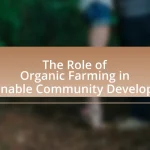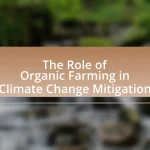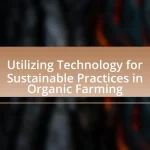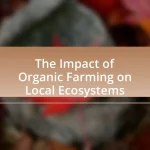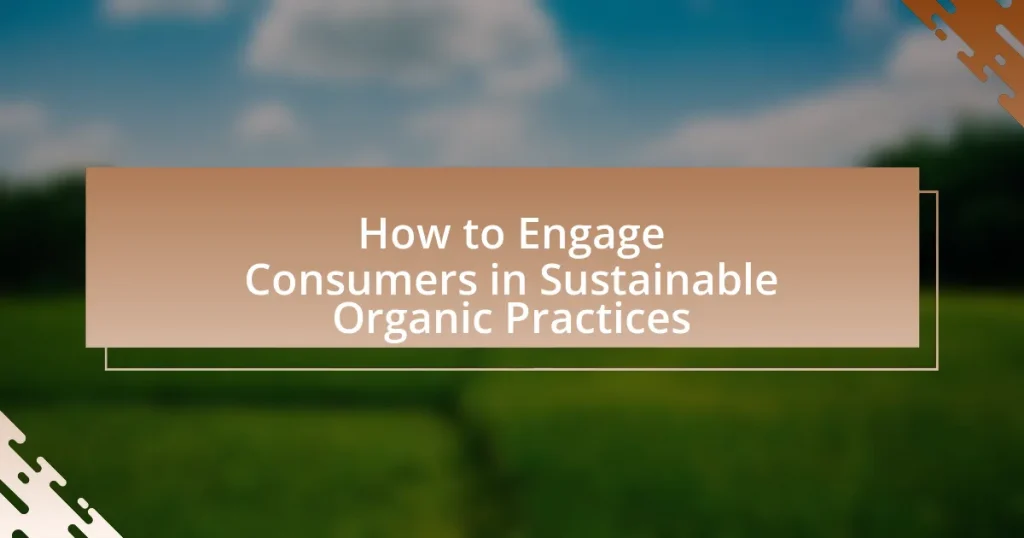Sustainable organic practices are agricultural methods that prioritize environmental health, social equity, and economic viability while avoiding synthetic chemicals. This article explores the differences between sustainable organic practices and conventional farming, emphasizing key principles such as biodiversity, soil health, and minimizing environmental impact. It also examines the role of consumers in promoting these practices through their purchasing choices, the importance of transparency and education in building trust, and the challenges faced in engaging consumers. Additionally, it highlights effective strategies for businesses to foster consumer engagement, including community partnerships, loyalty programs, and educational initiatives.

What are Sustainable Organic Practices?
Sustainable organic practices are agricultural methods that prioritize environmental health, social equity, and economic viability while avoiding synthetic chemicals and genetically modified organisms. These practices include crop rotation, composting, cover cropping, and integrated pest management, which enhance soil fertility and biodiversity. Research indicates that organic farming can reduce greenhouse gas emissions by up to 40% compared to conventional methods, supporting the claim that sustainable organic practices contribute to climate change mitigation.
How do Sustainable Organic Practices differ from conventional methods?
Sustainable organic practices differ from conventional methods primarily in their approach to agriculture, emphasizing ecological balance and biodiversity. Sustainable organic practices avoid synthetic fertilizers and pesticides, relying instead on natural inputs and methods such as crop rotation, composting, and biological pest control. This approach not only enhances soil health but also reduces environmental pollution, as evidenced by a study published in the journal “Agriculture, Ecosystems & Environment,” which found that organic farming systems can improve soil quality and increase biodiversity compared to conventional farming. Additionally, sustainable organic practices prioritize animal welfare and promote sustainable land use, contrasting with conventional methods that often focus on maximizing yield through chemical inputs and monoculture.
What are the key principles of Sustainable Organic Practices?
The key principles of Sustainable Organic Practices include promoting biodiversity, enhancing soil health, and minimizing environmental impact. Biodiversity is encouraged through crop rotation and polyculture, which help maintain ecosystem balance and resilience. Enhancing soil health involves using organic fertilizers and compost, which improve soil structure and fertility, leading to better crop yields. Minimizing environmental impact is achieved by avoiding synthetic pesticides and fertilizers, thereby protecting water quality and reducing pollution. These principles are supported by research indicating that organic farming can lead to improved ecosystem services and sustainable agricultural practices.
Why is biodiversity important in Sustainable Organic Practices?
Biodiversity is crucial in sustainable organic practices because it enhances ecosystem resilience and productivity. Diverse ecosystems support a variety of species that contribute to soil health, pest control, and pollination, which are essential for organic farming. For instance, studies show that farms with higher biodiversity can yield up to 20% more produce due to improved ecosystem services. Additionally, biodiversity helps in maintaining genetic diversity, which is vital for adapting to changing environmental conditions and combating pests and diseases. This interconnectedness of species ultimately leads to more sustainable agricultural systems that can thrive without synthetic inputs.
What role do consumers play in promoting Sustainable Organic Practices?
Consumers play a crucial role in promoting Sustainable Organic Practices by driving demand for organic products and influencing market trends. Their purchasing choices directly impact agricultural practices, as increased consumer interest in organic goods encourages farmers to adopt sustainable methods. For instance, a 2021 report from the Organic Trade Association indicated that U.S. organic sales reached $61.9 billion, reflecting a growing consumer preference for organic products. This shift not only supports environmentally friendly farming but also fosters a market that prioritizes sustainability, thereby encouraging more producers to transition to organic practices.
How can consumer choices impact organic farming?
Consumer choices significantly impact organic farming by driving demand for organic products, which influences farmers’ production decisions. When consumers prioritize organic goods, they create a market incentive for farmers to adopt organic practices, leading to increased acreage dedicated to organic farming. According to the Organic Trade Association, the U.S. organic market reached $62 billion in sales in 2020, demonstrating a clear consumer preference for organic products. This demand encourages farmers to transition from conventional to organic methods, thereby promoting sustainable agricultural practices and biodiversity.
What are the motivations behind consumer interest in sustainability?
Consumer interest in sustainability is primarily motivated by environmental concerns, social responsibility, and personal health. Research indicates that 66% of global consumers are willing to pay more for sustainable brands, reflecting a growing awareness of climate change and ecological degradation. Additionally, consumers are increasingly influenced by the desire to support ethical practices, such as fair labor conditions and animal welfare. The health benefits associated with sustainable products, including organic food, further drive this interest, as consumers seek to avoid harmful chemicals and promote their well-being. These motivations are supported by studies showing that sustainable purchasing behaviors are linked to a consumer’s values and beliefs about the impact of their choices on the planet and society.
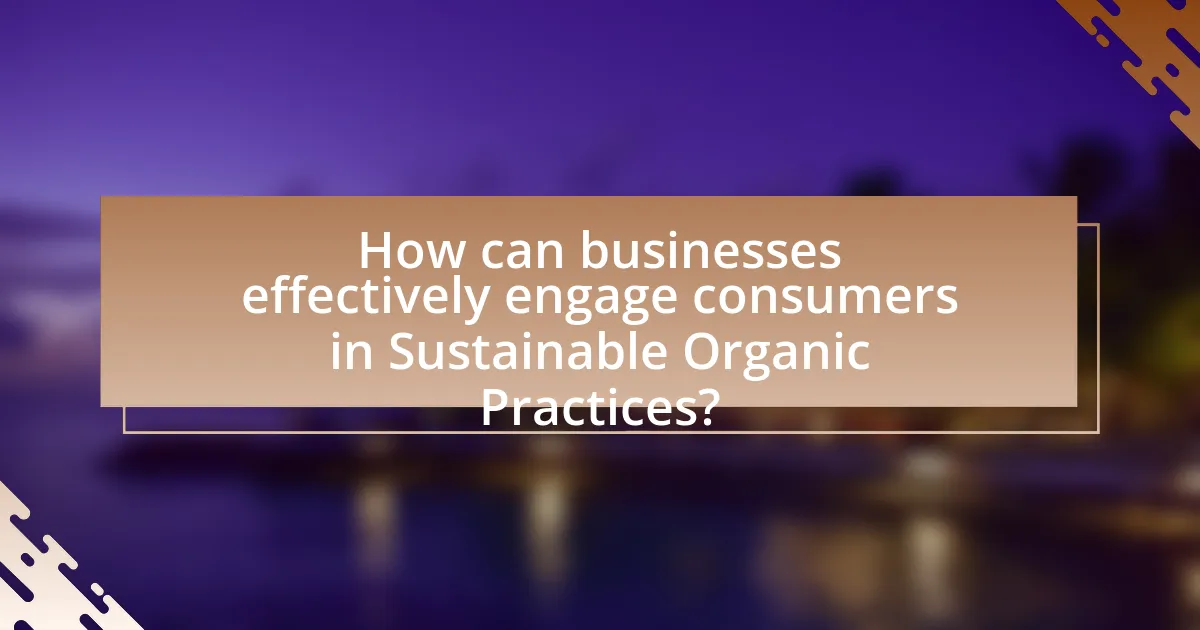
How can businesses effectively engage consumers in Sustainable Organic Practices?
Businesses can effectively engage consumers in Sustainable Organic Practices by implementing transparent communication strategies that highlight the environmental and health benefits of organic products. For instance, companies can share detailed information about their sourcing, production methods, and the positive impact on biodiversity and soil health. Research indicates that 73% of consumers are willing to pay more for sustainable products, demonstrating a strong market demand for transparency and ethical practices. By utilizing social media campaigns and educational content, businesses can foster a community around sustainable living, encouraging consumer participation and loyalty.
What strategies can businesses use to raise awareness about sustainability?
Businesses can raise awareness about sustainability by implementing educational campaigns that inform consumers about sustainable practices and their benefits. These campaigns can include workshops, webinars, and social media initiatives that highlight the importance of sustainability in everyday choices. For instance, a study by the Nielsen Global Sustainability Report found that 66% of consumers are willing to pay more for sustainable brands, indicating a strong market interest in sustainability. Additionally, businesses can collaborate with environmental organizations to enhance credibility and reach a broader audience, further reinforcing their commitment to sustainability.
How can storytelling enhance consumer engagement with organic products?
Storytelling enhances consumer engagement with organic products by creating emotional connections and fostering brand loyalty. When brands share narratives about their origins, farming practices, and the benefits of organic products, they resonate with consumers’ values and beliefs. Research indicates that 55% of consumers are more likely to purchase from brands that tell compelling stories, as these narratives help to humanize the brand and make the products more relatable. Additionally, storytelling can effectively communicate the environmental and health benefits of organic products, reinforcing the consumer’s decision to choose sustainable options. This approach not only increases awareness but also encourages repeat purchases, as consumers feel a part of the brand’s journey and mission.
What role does social media play in promoting Sustainable Organic Practices?
Social media plays a crucial role in promoting sustainable organic practices by facilitating information sharing and community engagement. Platforms like Instagram, Facebook, and Twitter enable organic farmers and advocates to showcase their practices, share success stories, and educate consumers about the benefits of sustainable agriculture. For instance, a study published in the Journal of Cleaner Production found that social media campaigns significantly increased consumer awareness and interest in organic products, leading to a 30% rise in engagement with sustainable brands. This demonstrates that social media not only raises awareness but also fosters a community of informed consumers who are more likely to support sustainable organic practices.
How can businesses build trust with consumers regarding organic practices?
Businesses can build trust with consumers regarding organic practices by ensuring transparency in their sourcing and production processes. Transparency allows consumers to verify the authenticity of organic claims, which is crucial since a 2021 survey by the Organic Trade Association found that 82% of consumers are concerned about misleading organic labeling. By providing clear information about certifications, ingredient sourcing, and farming methods, businesses can demonstrate their commitment to genuine organic practices. Additionally, engaging in third-party certifications, such as USDA Organic, reinforces credibility, as these certifications are recognized and trusted by consumers.
What certifications should consumers look for in organic products?
Consumers should look for certifications such as USDA Organic, EU Organic, and Certified Organic by reputable organizations. The USDA Organic certification ensures that products meet strict federal guidelines for organic farming and processing in the United States, including the prohibition of synthetic fertilizers and pesticides. The EU Organic certification signifies compliance with European Union regulations, which also emphasize sustainable agricultural practices. Additionally, certifications from organizations like Oregon Tilth or the Non-GMO Project provide further assurance of organic integrity and non-GMO status. These certifications are critical as they provide transparency and trust in the organic labeling system, helping consumers make informed choices about the products they purchase.
How can transparency in sourcing influence consumer decisions?
Transparency in sourcing significantly influences consumer decisions by fostering trust and loyalty towards brands. When consumers are aware of the origins of products, including ethical practices and sustainability efforts, they are more likely to support those brands. A study by Nielsen found that 66% of global consumers are willing to pay more for sustainable brands, indicating that transparency can directly impact purchasing behavior. Furthermore, brands that openly share their sourcing practices can differentiate themselves in a crowded market, appealing to the growing demographic of environmentally conscious consumers.
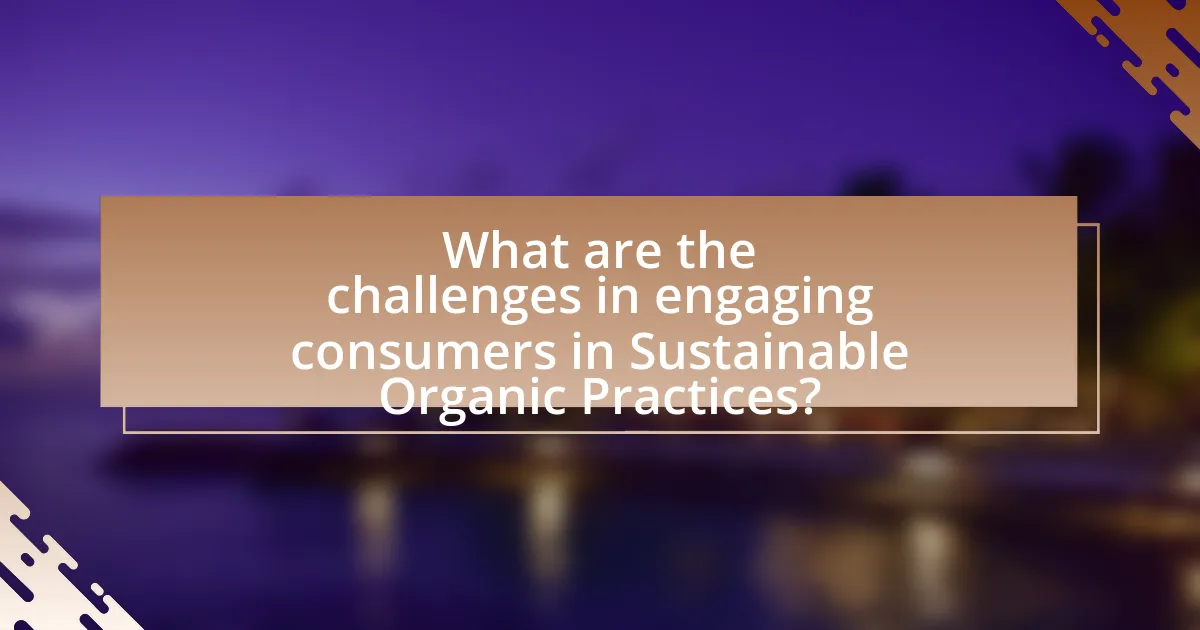
What are the challenges in engaging consumers in Sustainable Organic Practices?
Engaging consumers in Sustainable Organic Practices faces several challenges, primarily including lack of awareness, perceived higher costs, and limited accessibility. Many consumers are unaware of the benefits of sustainable organic practices, which can lead to indifference or skepticism about their importance. Additionally, organic products often come with a higher price tag, which can deter price-sensitive consumers from making sustainable choices. Accessibility is another significant barrier, as not all consumers have easy access to organic products, particularly in food deserts or rural areas. These challenges are supported by research indicating that consumer education and price incentives are crucial for increasing engagement in sustainable practices.
What misconceptions do consumers have about organic products?
Consumers often believe that organic products are always healthier than conventional ones, but this is not universally true. While organic farming practices reduce pesticide use and promote biodiversity, the nutritional differences between organic and conventional foods can be minimal. A study published in the British Journal of Nutrition found that organic produce does not consistently contain higher levels of vitamins or minerals compared to non-organic options. Additionally, some consumers think that organic products are free from all chemicals, which is misleading; organic farming can still use certain approved synthetic substances. These misconceptions can lead to unrealistic expectations about the benefits of organic products.
How can businesses address common myths about organic farming?
Businesses can address common myths about organic farming by providing clear, factual information and engaging educational campaigns. For instance, many consumers believe that organic farming is less productive than conventional methods; however, studies show that organic farms can yield comparable results, especially when considering long-term soil health and sustainability. By sharing research from credible sources, such as the Rodale Institute, which found that organic farming can produce yields similar to conventional farming over time, businesses can effectively counter misinformation. Additionally, hosting workshops, creating informative content, and utilizing social media platforms to disseminate accurate data can further help in dispelling myths and fostering a better understanding of organic practices among consumers.
What barriers do consumers face in adopting sustainable practices?
Consumers face several barriers in adopting sustainable practices, including high costs, lack of information, and convenience issues. High costs deter many individuals from purchasing sustainable products, as they often come with a premium price tag compared to conventional alternatives. A study by the Nielsen Company found that 66% of global consumers are willing to pay more for sustainable brands, but the actual purchasing behavior often reflects a preference for lower-priced options due to budget constraints.
Additionally, a lack of information about the benefits and availability of sustainable products creates confusion and skepticism among consumers. Research from the Journal of Consumer Research indicates that consumers often do not trust sustainability claims due to greenwashing, where companies exaggerate their environmental efforts.
Convenience also plays a significant role; many consumers find it easier to choose conventional products that are readily available rather than seeking out sustainable options, which may not be as accessible in their local markets. According to a report by the World Economic Forum, 70% of consumers cite convenience as a primary factor influencing their purchasing decisions. These barriers collectively hinder the widespread adoption of sustainable practices among consumers.
How can businesses overcome these challenges?
Businesses can overcome challenges in engaging consumers in sustainable organic practices by implementing targeted education and awareness campaigns. These campaigns can inform consumers about the benefits of sustainable practices, such as improved health and environmental impact, thereby increasing consumer interest and participation. Research indicates that 66% of consumers are willing to pay more for sustainable brands, highlighting the potential market for businesses that effectively communicate their sustainability efforts. Additionally, businesses can collaborate with local communities and organizations to promote sustainable practices, creating a sense of shared responsibility and enhancing consumer trust.
What educational initiatives can help consumers understand organic practices?
Educational initiatives that can help consumers understand organic practices include workshops, online courses, and community outreach programs. Workshops provide hands-on experiences where consumers can learn about organic farming techniques, soil health, and pest management. Online courses, often offered by universities or agricultural organizations, allow consumers to access information about organic certification, benefits of organic products, and sustainable practices at their convenience. Community outreach programs, such as farm tours and local farmers’ markets, facilitate direct interaction between consumers and organic farmers, enhancing understanding through personal engagement. Research indicates that educational programs significantly increase consumer knowledge and willingness to purchase organic products, as evidenced by a study published in the Journal of Consumer Research, which found that informed consumers are more likely to choose organic options.
How can partnerships with local communities enhance consumer engagement?
Partnerships with local communities enhance consumer engagement by fostering trust and authenticity in brand messaging. When businesses collaborate with local organizations, they demonstrate a commitment to social responsibility and sustainability, which resonates with consumers increasingly concerned about ethical practices. For instance, a study by Cone Communications found that 87% of consumers are more likely to purchase a product from a company that supports a cause they care about. This alignment with community values not only strengthens brand loyalty but also encourages consumers to participate in sustainable practices, as they feel a personal connection to the initiatives promoted by the brand.
What are some best practices for engaging consumers in Sustainable Organic Practices?
To effectively engage consumers in Sustainable Organic Practices, businesses should prioritize transparency, education, and community involvement. Transparency involves clearly communicating the sourcing, production methods, and benefits of organic products, which builds trust with consumers. Education can be achieved through workshops, informative content, and social media campaigns that highlight the environmental and health benefits of sustainable practices. Community involvement fosters a sense of belonging and encourages consumers to participate in local sustainability initiatives, such as farmers’ markets or community gardens. Research indicates that consumers are more likely to support brands that demonstrate a commitment to sustainability, with 66% of global consumers willing to pay more for sustainable brands (Nielsen, 2015).
How can businesses create loyalty programs that promote sustainability?
Businesses can create loyalty programs that promote sustainability by offering rewards for eco-friendly purchases and behaviors. For instance, companies can provide points for buying sustainable products, recycling, or using reusable bags, which encourages customers to make environmentally conscious choices. Research indicates that 66% of consumers are willing to pay more for sustainable brands, highlighting the potential for increased customer engagement through such programs. Additionally, integrating educational components about sustainability into the loyalty program can further enhance consumer awareness and commitment to sustainable practices.
What role do workshops and events play in consumer engagement?
Workshops and events play a crucial role in consumer engagement by providing interactive platforms for education and community building. These gatherings allow consumers to learn about sustainable organic practices firsthand, fostering a deeper understanding and connection to the subject. For instance, research from the Journal of Consumer Research indicates that experiential learning, such as that offered in workshops, significantly enhances consumer knowledge retention and motivation to adopt sustainable behaviors. By participating in hands-on activities, consumers are more likely to feel empowered and committed to implementing sustainable practices in their own lives.

